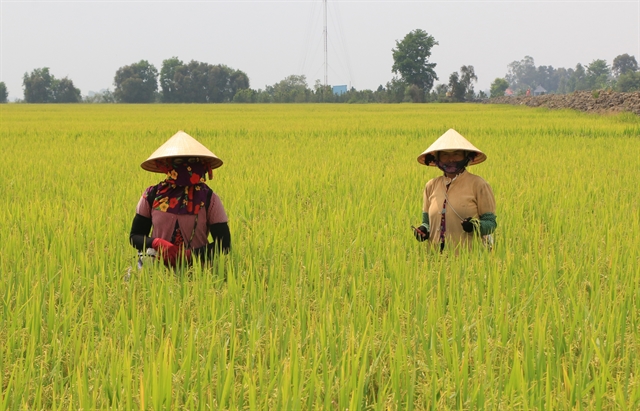 Society
Society

 |
| Farmers of the Thạnh Lợi Agriculture Service Co-operative in Đồng Tháp Province’s Tháp Mười District tend rice plants. The co-operative has linked with companies to produce rice seeds. — VNA/VNS Photo Nhựt An |
ĐỒNG THÁP — Đồng Tháp Province is boosting the development of collective agricultural economy, especially co-operatives, to increase production scale, quality and efficiency.
The Cửu Long (Mekong) Delta province now has a total of 235 co-operatives, including 193 agricultural co-operatives with a total of more than 29,800 members.
Co-operatives in the province earn an average revenue of VNĐ1.2 billion (US$49,400) a year and their workers have an income of VNĐ76 million ($3,100) a year.
Đồng Tháp, which is one of the delta’s largest producers of rice, mango and tra fish, has strong potential for further development of collective agricultural economy.
The Tân Bình Co-operative in Thanh Bình District’s Tân Bình Commune is one of the province’s most effective co-operatives and offers agricultural services such as pumping, rice harvest and drying, fertilising and tilling.
It also produces more than 2.2 million tomato and red chili seedlings a year in a 1,000sq.m net house.
The province established six new agricultural co-operatives in the first half of the year, according to its Department of Agriculture and Rural Development.
Many agricultural co-operatives in the province have been established from farmers’ clubhouses, which link farmers together to exchange farming techniques and other information.
Under the farmers’ clubhouse model, farmers who grow the same crop participate voluntarily in a group known as a farmers’ clubhouse.
The Tịnh Thới Agriculture Service Co-operative in Cao Lãnh City was established from the merging of Đồng Tâm and Thịnh Hưng farmers’ clubhouses in 2018.
It has 176 members who grow more than 138ha of mango, mostly Cát Chu, a specialty variety.
Võ Tấn Bảo, director of Tịnh Thới, said the co-operative’s members are provided with advanced growing techniques and have large mango areas planted under Vietnamese good agricultural practices (VietGAP) and organic standards.
The co-operative has linked with some companies and supermarkets to sell mango, and is the province’s first co-operative that exports mangoes to many demanding markets, he said.
Nguyễn Phước Thiện, deputy chairman of the provincial People’s Committee, said Đồng Tháp is the first locality in the delta that has established the model of farmers’ clubhouses.
Farmers’ clubhouses help link farmers together to increase production efficiency, and also contribute to build new-style rural areas and realise State policies, he said.
The province has 135 farmers’ clubhouses with a total of nearly 7,000 members, and they operate in various fields such as growing fruits and vegetables, producing flour, trading and tourism services.
Integration
Đồng Tháp is a leader in the delta in adapting to and meeting the requirements of international economic integration, according to local authorities.
It has actively improved the operation quality of co-operatives towards integration, effectiveness and efficiency.
It has implemented various policies to assist the development of co-operatives and co-operative groups, such as supporting young people to work for them and developing linkages among stakeholders in producing and selling products.
Up to 82 agricultural co-operatives and three agricultural co-operative groups have registered to recruit 144 young workers to work for them in 2023-25, according to the Department of Agriculture and Rural Development.
Agricultural co-operatives, co-operative groups and farmers’ clubhouses have increased their linkages with companies to guarantee buyers and stable prices for their products.
Chung Văn Liệu, chairman of the Hòa Bình Agriculture Service Co-operative in Tam Nông District’s Hòa Bình Commune, said the co-operative has linked with Lộc Trời Group to produce rice seeds.
“The co-operative’s farmers get a profit of VNĐ10-15 million ($410-620) per hectare higher than farmers who produce rice seeds under traditional farming methods and have no such linkage,” he said.
Some agricultural co-operatives in the province have applied digital transformation to trace product origin and apply smart farming to increase production efficiency.
The Thành Nguyên Agricultural Produce Co-operative in Châu Thành District’s Tân Bình Commune, for instance, has used digital transformation technology to trace product origin for its 10ha lime orchard.
The province has 64 co-operatives, 57 co-operative groups and 13 farmers’ clubhouses which have been granted production codes for agricultural produce to increase quality and export.
To get the code, each type of plant must have a certain minimum growing area and be planted to Vietnamese good agricultural practices (VietGAP) or other equivalent standards. — VNS




